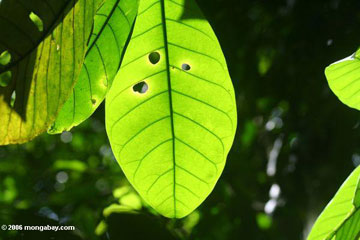Indonesia to push carbon-credits for peatlands conservation
Indonesia to push carbon-credits for peatlands conservation
mongabay.com
August 27, 2007
Indonesia plans to seek carbon credits for protecting its carbon-rich peatlands, a forestry official said on Monday.
Wahjudi Wardojo, director general for forestry research at Indonesia’s Forestry Ministry, told Reuters that industrialized countries will need to provide financial incentives for tropical countries to preserve ecosystems — like peatlands — that sequester large amounts of carbon.
“In order for Indonesia to properly preserve its peatlands, the world has to provide incentives, because we know that peat absorbs carbon more than anything else in the world,” Wardojo was quoted as saying. “We think the current scheme has to be reviewed. The carbon market should be allowed to finance restoration of degraded land and reforestation of any kind, because there should be incentives for any effort to reduce carbon emission.”
Wardojo is working on a draft proposal for the U.N. climate conference meeting in Bali in December.

|
“The draft will include long-term projections, showing that businesses can profit by taking part in the RED scheme by aborting peatland conversion projects than cashing in on palm oil,” Wardojo said. “Once completed, it will become Indonesia’s ammunition to seal the new climate deal.”
Degradation of Indonesia’s peatlands and forest ecosystems is estimated by Wetlands International to release more than 2 billion tons of carbon (7.3 billion tons of carbon dioxide) per year, making the country the third largest producer of greenhouse gases. Slowing destruction of these lands would have a significant impact on global emissions.
“Among the challenges is keeping track of all the types of peatlands, their status and condition. Then to put a price tag on each of them is another major challenge,” Wardojo said.
Investors — ranging from wealthy individuals to banks, hedge funds, and forestry companies — have been evaluating the potential but have been hesitant to make deals before a binding framework is in place. Still, it is expected that carbon offsets will soon be a hot market in Indonesia.
Related articles
Could peatlands conservation be more profitable than palm oil?
(8/22/2007) This past June, World Bank published a report warning that climate change presents serious risks to Indonesia, including the possibility of losing 2,000 islands as sea levels rise. While this scenario is dire, proposed mechanisms for addressing climate change, notably carbon credits through avoided deforestation, offer a unique opportunity for Indonesia to strengthen its economy while demonstrating worldwide innovative political and environmental leadership. In a July 29th editorial we argued that in some cases, preserving ecosystems for carbon credits could be more valuable than conversion for oil palm plantations, providing higher tax revenue for the Indonesian treasury while at the same time offering attractive economic returns for investors.
Papua seeks funds for fighting global warming through forest conservation
(8/10/2007) In an article published today in The Wall Street Journal, Tom Wright profiles the nascent “avoided deforestation” carbon offset market in Indonesia’s Papua province. Barnabas Suebu, governor of the province which makes up nearly half the island of New Guinea, has teamed with an Australian millionaire, Dorjee Sun, to develop a carbon offset plan that would see companies in developing countries pay for forest preservation in order to earn carbon credits. Compliance would be monitored via satellite.
Indonesia’s peat swamps worth $39B/year
(7/11/2007) Indonesia’s peat swamps are worth $39 billion in carbon credits per year, according to rough calculations by Bloomberg.